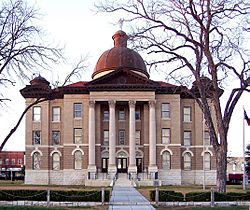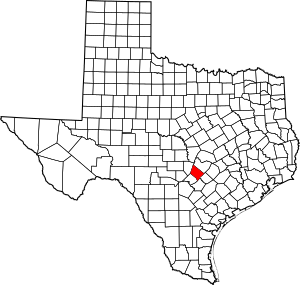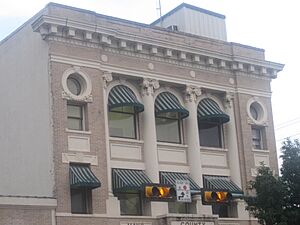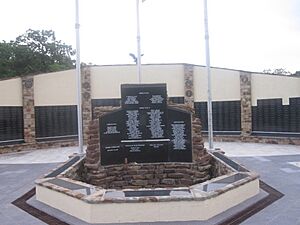Hays County, Texas facts for kids
Quick facts for kids
Hays County
|
|
|---|---|

Hays County Courthouse, built in 1908 using the eclectic style of architecture
|
|

Location within the U.S. state of Texas
|
|
 Texas's location within the U.S. |
|
| Country | |
| State | |
| Founded | 1848 |
| Named for | John Coffee Hays |
| Seat | San Marcos |
| Largest city | San Marcos |
| Area | |
| • Total | 680 sq mi (1,800 km2) |
| • Land | 678 sq mi (1,760 km2) |
| • Water | 1.9 sq mi (5 km2) 0.3% |
| Population
(2020)
|
|
| • Total | 241,067 |
| • Estimate
(2023)
|
269,103 |
| • Density | 354.5/sq mi (136.9/km2) |
| Time zone | UTC−6 (Central) |
| • Summer (DST) | UTC−5 (CDT) |
| Congressional districts | 21st, 35th |

Hays County is a county in the central part of Texas, a state in the United States. It is part of the larger Austin-Round Rock city area. In 2020, about 241,067 people lived there. The main city and county seat is San Marcos. Hays County is known for growing very quickly. In 2017, it was one of the fastest-growing counties in the country.
The county got its name from John Coffee Hays. He was a famous Texas Ranger and an officer in the Mexican–American War. He also fought in battles between Texans and Comanches in the 1800s.
Contents
History of Hays County
Hays County has a long and interesting history. People have lived in this area for thousands of years. Scientists have found signs of early people, called Paleo-Indians, from as far back as 6000 BC. There is also proof that native people farmed here around 1200 AD.
Early European Visitors
The first Europeans to visit the area were explorers and missionaries from Spain. In 1709, Father Isidro Félix de Espinosa and others traveled through the region. A few years later, in 1714, a French-Canadian explorer named Louis Juchereau de St. Denis was attacked by Comanches.
In 1755, a more lasting European presence began. The Mission San Francisco Xavier de los Dolores was built for the Apache tribe. Later, in the 1830s, the Mexican government gave land grants to settlers. Thomas G. McGhee from Tennessee was the first Anglo-American settler to receive land here in 1835.
Forming the County
On March 1, 1848, the Texas government officially created Hays County. It was formed from a part of Travis County. The county was named after Captain John Coffee Hays, a brave Texas Ranger. San Marcos was chosen as the county seat. Later, in 1858, a part of Hays County became Blanco County. However, Hays County also gained some land from Comal County.
Growth and Development
In 1861, people in Hays County voted to leave the Union during the American Civil War. The next year, more land from Comal County was added to Hays County. In 1867, the first cattle drive from Hays County to Kansas took place.
The International-Great Northern Railroad reached San Marcos from Austin in 1880. This helped the county grow. In 1899, a teacher's college, Southwest Texas State Normal School, was started in San Marcos. This school is now Texas State University.
Many important places opened in the early 1900s. Wonder Cave opened to visitors in 1900. The beautiful Hays County Courthouse was built in 1908. The Aquarena Springs tourist site opened in San Marcos in 1928.
Modern Times
Lyndon Baines Johnson, who later became a U.S. President, graduated from Southwest Texas State Teachers College in 1930. During World War II, the San Marcos Army Air Field was built in 1942. It was later renamed Gary Air Force Base. In 1964, President Lyndon Johnson announced that a Job Corps center would be set up at the old Gary Air Force Base.
Geography of Hays County
Hays County covers about 680 square miles. Only a small part of this area, about 1.9 square miles, is covered by water. Most of the county is in a region called the Edwards Plateau. The southeastern part is in the Texas Blackland Prairies.
Neighboring Counties
Hays County shares borders with several other counties:
- Travis County (to the north)
- Caldwell County (to the east)
- Guadalupe County (to the southwest)
- Comal County (to the south)
- Blanco County (to the northwest)
Transportation
Major Roads
Several important highways run through Hays County:
 Interstate 35
Interstate 35 U.S. Highway 290
U.S. Highway 290 State Highway 21
State Highway 21 State Highway 80
State Highway 80
Airport
- San Marcos Regional Airport is a general aviation airport. This means it is used for private planes and training, not for commercial flights with passengers.
Education in Hays County
Hays County has many schools for students of all ages.
School Districts
Several school districts serve the county:
- Blanco
- Comal
- Dripping Springs Independent
- Hays Consolidated Independent
- Johnson City
- San Marcos Consolidated
- Wimberley Independent
As of 2020, the county had six high schools, 10 middle schools, and 24 elementary schools.
Higher Education
For students who want to go to college, Hays County has Texas State University in San Marcos. This is a four-year university.
Austin Community College also serves the entire county. It has centers that offer basic classes, early college programs, and testing for online courses.
Population and People
Hays County has grown a lot over the years. In 1850, only 387 people lived here. By 2020, the population had grown to 241,067 people. The county is known for its diverse population, meaning people from many different backgrounds live and work together.
The county's population has continued to increase rapidly. This growth brings new people and ideas to the area.
Communities in Hays County
Hays County is home to many cities and towns.
Cities (in multiple counties)
Some cities are so large they spread into more than one county:
- Austin (mostly in Travis County and a small part in Williamson County)
- Niederwald (partly in Caldwell County)
- San Marcos (the county seat, with small parts in Caldwell and Guadalupe counties)
- Uhland (partly in Caldwell County)
Cities
Village
Census-designated places
These are areas that are like towns but are not officially incorporated as cities:
Images for kids
See also
 In Spanish: Condado de Hays para niños
In Spanish: Condado de Hays para niños
 | Precious Adams |
 | Lauren Anderson |
 | Janet Collins |






